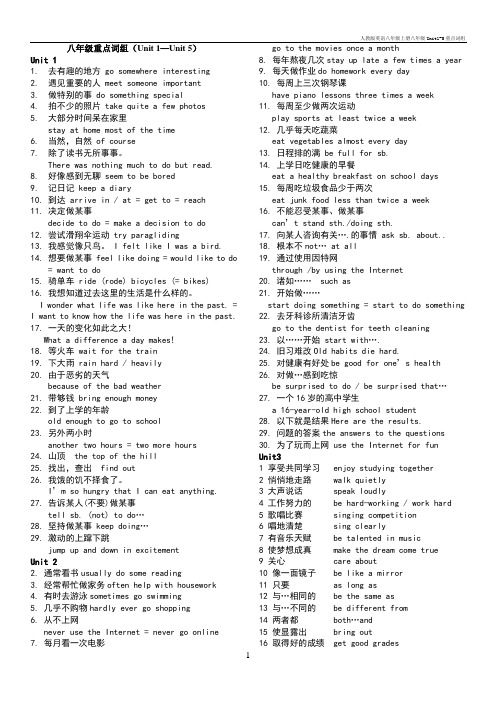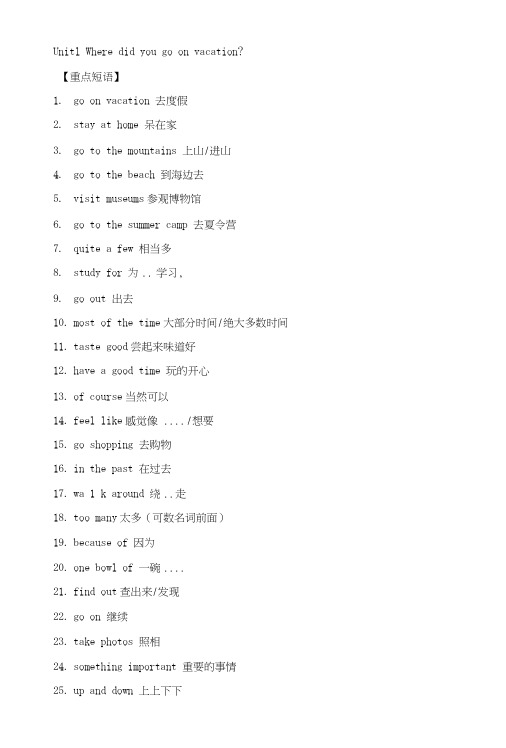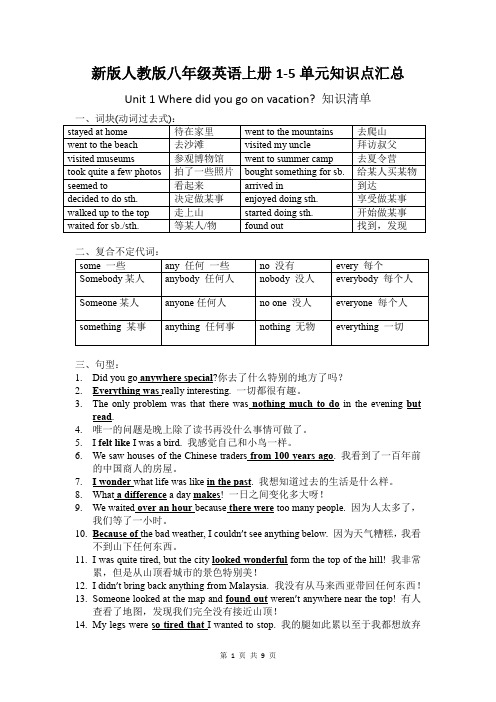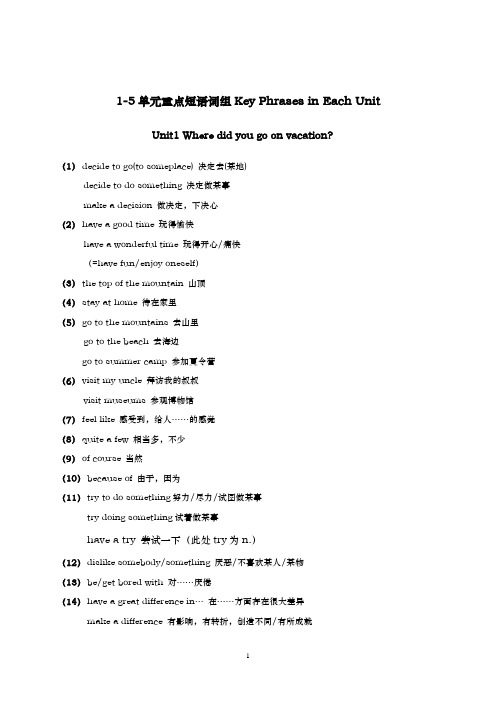新人教版八年级上英语1-5单元重点单词-短语和语法
人教版新目标八年级英语上册1-5单元知识点总结

新目标八年级英语上册第一单元Unit 1.How often do you exercise?I. 重点短语归纳:on weekends 在周末1. go to the movies 去看电影2. look after=take care of 照顾3. surf the internet 上网4. healthy lifestyle 健康的生活方式5. go skateboarding 去滑滑板watch TV看电视6. keep healthy=stay healthy = keep in good health 保持健康keep + 形容词表保持某种状态do some reading 阅读7. exercise= take/do (much) exercise=do sports锻炼8. eating habits 饮食习惯9. take more exercise 做更多的运动10. the same as 与什么相同11. once a month一月一次12. be different from 不同13. twice a week一周两次.three times a week一周三次14. make a difference to 对什么有影响As teachers, you must believe that you can make a difference to the lives of your students.身为教师,你们必须坚信你们能够影响学生的一生。
A false step will make a great difference to my future.错走一步对我的前程来说会产生很大影响。
15. how often 多久一次,询问动作发生的频率how many times 多少次,用来提问做某事的次数16. although=though虽然 <不能与but连用>Although he is old, he is quite strong.(He is old, but he is quite strong.)句子中,有although或though就不可再用but,但可用yet或still“仍然,还”;有because就不能再用so.17. most of the students=most students大多数学生18. shop=go shopping=do some shopping 购物19. as for至于20. activity survey活动调查21. do homework做家庭作业22. do house work做家务事23. eat less meat吃更少的肉24. junk food垃圾食物25. be good for 对什么有益26. be bad for对什么有害27. want to do sth 想做某事28. want sb to do sth想某人做某事29. try to do sth 尽量做某事30. come home from school放学回家31. of course=certainly=sure当然32. get good grades取得好成绩33. some advice 一些建议some advice 中的advice 是不可数名词 a piece of advice 一则建议give advice 提出建议take one’s advice 采纳或听从某人的建议4. help sb to do sth帮助某人做某事=help sb with sth35. a lot of vegetables=many vegetables许多蔬菜36. hardly= almost not几乎不 hardly ever很少,几乎不,从不37. keep/be in good health保持健康38. your favorite program你最喜欢的节目39. Animal World 动物世界40. play soccer踢足球41.every day 每天every day 与 everyday1. every day 作状语,译为“每一天”。
八年级上册英语Unit1-5单元知识点归纳

八年级上册英语Unit1-5单元知识点归纳Unit 1 Where did you go on vacation?一、短语归纳1. go on vacation =take/ have a vacation 去度假2. stay at home 待在家里3. go to the mountains/the beach/summer camp 去山区/海滩/ 夏令营4. visit museums/ my uncle 参观博物馆/看望我的叔叔或伯伯5. study for… 为……而学习6. go out 出去7. most/many/ much/some of. 大部分/许多/一些……8. have a good time= have fun= enjoy oneself 玩得高兴;过得愉快9. of course 当然;自然10. keep a diary 记日记11. go shopping/fishing/camping/skating /boating/ hiking/swimming 去购物/钓鱼/野营/滑冰/划船/远足/游泳12. in the past 在过去13. walk around 四处走走14. too many/much 太多15. because of 因为16. one bowl of… 一碗……17. the next day 第二天18. drink tea 喝茶19. find out 找出;查明20. go on 继续21. take photos 照相22. something important 重要的事23. up and down 上上下下24. come up 升起25. wait for 等待26. in excitement 兴奋地;激动地27. bring back…from… .从……带回……28. walk up to 步行到…二、用法集萃1. quite a few/a little/a lot(of) 相当多;不少eg: We took quite a few photos there.我们在那里拍了很多照片。
人教版英语八年级上册八年级Unit1-5重点词组

人教版英语八年级上册八年级Unit1-5重点词组八年级重点词组(Unit 1—Unit 5)Unit 11.去有趣的地方 go somewhere interesting2.遇见重要的人 meet someone important3.做特别的事 do something special4.拍不少的照片 take quite a few photos5.大部分时间呆在家里stay at home most of the time6.当然,自然 of course7.除了读书无所事事。
There was nothing much to do but read.8.好像感到无聊 seem to be bored9.记日记 keep a diary10.到达 arrive in / at = get to = reach11.决定做某事decide to do = make a decision to do12.尝试滑翔伞运动 try paragliding13.我感觉像只鸟。
I felt like I was a bird.14.想要做某事 feel like doing = would like to do= want to do15.骑单车 ride (rode) bicycles (= bikes)16.我想知道过去这里的生活是什么样的。
I wonder what life was like here in the past. =I want to know how the life was here in the past.17.一天的变化如此之大!What a difference a day makes!18.等火车 wait for the train19.下大雨 rain hard / heavily20.由于恶劣的天气because of the bad weather21.带够钱 bring enough money22.到了上学的年龄old enough to go to school23.另外两小时another two hours = two more hours24.山顶 the top of the hill25.找出,查出 find out26.我饿的饥不择食了。
【知识点】人教版八年级英语上册1~5单元重点单词,短语,句型全汇总,复习必备!.doc

Unitl Where did you go on vacation?【重点短语】1.go on vacation 去度假2.stay at home 呆在家3.go to the mountains 上山/进山4.go to the beach 到海边去5.visit museums参观博物馆6.go to the summer camp 去夏令营7.quite a few 相当多8.study for 为.. 学习,9.go out 出去10.most of the time大部分时间/绝大多数时间11.taste good尝起来味道好12.have a good time 玩的开心13.of course当然可以14.feel like感觉像 .... /想要15.go shopping 去购物16.in the past 在过去17.wa 1 k around 绕.. 走18.too many太多(可数名词前面)19.because of 因为20.one bowl of 一碗....21.find out查出来/发现22.go on 继续23.take photos 照相24.something important 重要的事情25.up and down 上上下下e up 出来【重点句型】1.--- Where did you go on vacation? 你到哪里去度假了?--- 1 went to New York City. 我去了纽约城。
2.--- Did you go out with anyone? 你出去带人吗?--- No, No one was herc. Everyone was on vacation. 不,没有人在这儿。
大家度去度假了。
3.--- Did you buy anything special? 你买了什么特别的东西吗?--- Yes, I bought something for my father.对,我给父亲买了一些东西。
人教版八年级英语上册1_5单元知识点(词汇+句型+固定搭配).doc

词汇 :1.how often: 多久一次how many: 多少 +可数名词2.always(100%)- 总是usually(80%) –通常often(60%)- 经常sometimes(40%)- 有时候hardly ever(20%)- 几乎不never(0%) 从不3.surf the internet: 上网4.as for: 至于,关于5.junk food: 垃圾食品6.look after = take care of:照顾 look for: 寻找look up: 查找(单词、信息)look at: 看Unit 1 How often do you exercise?7. health: 健康,12. on weekends: 在周末healthy:健康的13. once a week:一周一次unhealthy: 不健康,twice a week:一周两次keep/stay healthy three times a month: 一月三次= keep/stay in good health:保持健康14. most: 大部分的,绝大多数的8. get good grades:取得好成绩all: 所有的9. the same as:与不同15. be good for: 对有益10. a lot of = lots of: 大量,许多+ 可数 /不可数名词be bad for: 对有坏处a lot = very much: 十分 ,非常,很16. how many: 多少 , +可数名词11. maybe: 也许,大概how much: 多少, +不可数名词may be: 也许是,或许是(may是情态动词,be是动词原形)how much 多少钱,(问价格)12. little:小的,a little boy:一个小男孩17. of course = sure 当然little:少,little少→ less更少→ least最少(修饰不可数名词)little:几乎没有,否定词(修饰不可数名词)a little:少许,有一点,肯定词(修饰不可数名词)few: 几乎没有,否定词(修饰可数名词)a few 少许,有一点,肯定词(修饰可数名词)句型:1. How often do you exercise? → I exercise three times a week. How often does she shop? → She shops once a month.2. What do you usually do on weekends?→ I usually watch TV. How often does she watch TV? → She watches TV everyday.3. How many hours do you sleep every night? 你每晚睡几个小时?→ I sleep nine hours every night.How many books do you have? 你有多少本书?→ I have 5 books.How much is the sweater? 这件毛衣多少钱?How much water do you have? 你有多少水? (how much: 多少,后面 +不可数名词 , water 是不可数名词 )4. What’syour favorite program? 你最喜欢的电视节目是什么?→ It ’s Animal World.固定搭配:try to do sth.: 尽力做某事,设法做某事try doing sth.: 试着做、尝试做某事help sb. (to) do sth: 帮助某人做某事 (to 可以省略 )want sb. to do sth.: 想要某人做某事Unit 2 What ’s the matter? 词汇 :1.have a cold 感冒have a fever 发烧have a stomachache肚子痛 have a headache头疼have a toothache牙齿疼have a sore throat 喉咙疼have a sore back背部酸疼2.lie down and have a good rest躺下好好休息3.hot tea with honey 加了蜂蜜的热茶4.ill 病了的 illness 疾病5.advice 建议(不可数名词)some advice(不能加”s”)6.be stressed out有压力的,紧的7.balance 平衡 balanced 平衡的 a balanced diet 平衡的饮食on a diet 节食8.get 变得get angry 变得生气get tired 变得劳累9.few: 几乎没有,否定词(修饰可数名词)a few 少许,有一点,肯定词(修饰不可数名词)little:几乎没有,否定词(修饰不可数名词)a little:少许,有一点,肯定词(修饰不可数名词)10.at the moment = now 现在,此刻11.host family 寄宿家庭12.not until直到时候才13.should 应该,情态动词,后 +动词原形should not=shouldn’t14. see a doctor 看医生see a dentist 看牙医15. too many 太多,修饰可数名词too many students too much 太多,修饰不可数名词too much yin much too 太, much too big 太大16. stay=keep 保持keep/stay healthy= keep/stay in good health: 保持健康句型:1.What’s the matter with you? = What’s the trouble with you? = What’s wrong with you? 你怎么了?→ I have a cold/ have a toothache/ have a sore throat.2.What ’sthe matter? → She has a cold.3.Does hehave a cold? → Yes, he does.4.A: What’s the matter?B: I ’m not feeling well .(此处不能用 good) I have a cold.A: When did it start?B: About two days ago.A: That’stoo bad. You should drink lots of water.B: Yes, I think so.A: I hope you feel / get better soon. 我希望你尽快好起来5.A: I have a coldB: I am sorry to hear that. (当听到对方不好的消息时使用此句)固定搭配:It is + 形容词+ (for sb.) to do sth. 做某事对某人来说是的例句:It is easy for me to learn (learn) English. 对我来说学英语是容易的It is interesting to watch (watch) Animal World. 看动物世界时有趣的Unit 3 What are you doing for vacation?→→→ 本单元用现在进行时态表示将来的事情现在进行时态,即be + doing:词汇 :1. go camping 去野营go fishing去钓鱼go shopping 去购物go swimming 去游泳go hiking 去远足go bike riding 去骑单车go sightseeing 去观光旅游6. a lot = very much 十分、非常、很a lot of = lots of 许多、大量7. away 向远处、离开go away 离开8. stay: 留、停留、呆2. A: What are you doing for vacation?B: I am going camping.A: That sounds nice.Who are you going with?B: I am going with my parents .3. Linda is going to Tibet next summer.(划线提问)2. how long 多久、多长时间句型:→Where is Linda going next summer?3. get back 回来 get back to school4. be famous for以而闻名5. leave for离开去地方leave →(过去式 ) leftleft: 左边、离开1. What are you doing for vacation?→ I am visiting my grandparents.What is your brother doing for vacation?→ He is going camping.4. He’s going on the 12th . (划线提问)→ When is he going?5. I’m staying there for a week. (划线提问→How long are you staying?)6.当听到对方提出的建议,如:What about playing basketball? How about taking a walk with me? Why not go to the movie? 为什么不去看电影?I am going camping.等句子时,回答可用以下句型:That sounds nice/ good/ interesting/. That ’s a good idea. / Good idea. That sounds like a good idea./ Great 等 .7.当听到对方要去旅行或是准备出行时,如: I am going to Hongkong for a week. I am going hiking in the mountains.时,回答一般用以下句型: Have a good time!8. 询问天气: How is the weather? 或是 What’s the weather like?9. 询问某人的职业: What do you do? What are you? What’s your job? 你的工作是什么?What does your mother do? What is he? 他是干什么的?10. 询问某人的性格: What are you like? → I am outgoing/ shy/ quiet.What is he like? 他是个什么样的人?→ He is outgoing/ shy/ quiet. 他很外向/害羞/安静10. 询问某人长的什么样子: What does he look like ? 他长的什么样子?→ He is of medium build/height . 他中等身材 /身高 .What does your father look like ? → He is tall. 他很高11. 询问某人喜欢什么:What do you like? 你喜欢什么?→ I like basketball. 我喜欢篮球固定搭配:1. finish doing sth 完成做某件事例: I finished doing my homework. 我完成了我的家庭作业Unit 1-3 单元课本语法知识& 在讲解畅优新课堂时补充的语法知识点与固定搭配:1.情态动词后 +动词原形 (do)已学情态动词: can 能够 , must 必须 , should 应该 , may 也许 . would 想,会help sb (to) do sth 帮助某人做某事2.介词后若接动词,则接动词的 ing 形式:常见的: what about + doing sth? 做怎么样?常接 doing 的固定搭配:1. like doing sth 喜欢做某事2. enjoy doing sth 享受做某事3. have a good/ have fun in doing sth做某事玩的很开心4.finish doing sth 完成做某件事5. spend +(时间、金钱、精力 ) doing sth 花时间、金钱、精力做某事=spend +(时间、金钱、精力 ) on sth3.不定式,即: to do常接不定式的固定搭配:want sb to do sth 想要某人做某事 ask sb to do sth 要求某人做某事 need to do sth 需要做某事would like to do sth 想做某事plan to do sth 计划做某事forget to do sth忘记做某事tell sb to do sth 告诉某人做某事decide to do sth 决定做某事try to do sth 尽力做某事4.不定代词 + 形容词结构例: something interesting 一些有趣的事情Unit 4 How do you get to school? 词汇 :1. get to: 到达arrive at: 到达 + 小地点(学校、医院⋯)arrive in: 到达 + 点(城市、国家、地区⋯)reach: 到达2. take the bus = by bus:坐公交3. take the train = by train:坐火4. take the subway= by subway:坐地5. ride one’s bike = by bike:6. walk = on foot:走路8. how long: 多久,how far:多9. from⋯to⋯从⋯到⋯10. think of:think about: 考11. around the world = all over the world:12. be different from: 与⋯不同13. take⋯ to⋯把⋯到⋯14. from: 离⋯的距离15. not all: 不是所有全世界16. more⋯ than⋯:比⋯更⋯,than: 比7.depend on: ⋯⋯而定,决定于⋯⋯,依靠⋯⋯17.other 其他的,形容others 其他的人或其他的事the other 两者中的另一个,数概念the others 两部分中的另一部分,复数概念another 另外一个,另外的,第三个的18. than 比19. more⋯than⋯比⋯⋯更⋯⋯,形容比的用法句型:1.How do you get to school? → I take the bus . / I go to school by bus.How does she get to school?→ She takes the bus. / Shegoes to school by bus.2.How long does it take? → It takes about/around 10 minutes. → It takes about 25 minutesto walk and 10 minutesby bus. How long does it take you to get from home to school? → It takes 25 minutes.3. How far is it from your home to school?→ It’s3 miles./10 kilometers.4. What do you think of? = how do you like? 你认为怎么样?5. How far do you live from school?你住的离学校有多远→ I live 10 miles from school.6. Can I help you? May I help you? → Yes, please.固定搭配:1.It takes sb. + 时间 + to do sth. 例句: It takes me 20 minutesto walk (walk)2.need to do sth. 需要做某事3.more than 比更,形容词比较级的用法4形容词的比较级 & 最高级:规则变化:比较级:形容词尾 +“ er”,最高级: +“est ”,例: big → bigger → the biggest不规则变化:三个音节及以上的形容词(比较长的形容词),比较级:前面+ more,最高级:前面+most,例: popular 流行的→more popular更流行的→the most popular 最流行的最高级前面 +“the”例: This classroom is bigger than that one. 这件教室比那间大This classroom is the biggest. 这间教室是最大的Unit 5 Can you come to my party? 词汇:1.other 其他的The other 另一个 (两个中的另一个 )The others 另一部分(两部分中的另一部分)Another 另外的,另一个(三个以上中的另一个)2.the day before yesterday前天 yesterday 昨天today 今天tomorrow 明天the day after tomorrow 后天3.on weekends 在周末on weekdays 在工作日e over 顺便来访visit 拜访,看望,参观5.study for test 准备考试6.go to the doctor 看医生7.have a piano lesson上钢琴课8.too much homework 太多家庭作业much too 太 too many 太多 + 可数名词9. have to 不得不,要10. babysit= look after = take care of = care for 关心,照顾句型:1.Can you come to my party?Yes, I’d love to.(肯定回答 )I’m sorry, I can’t. I have to(否定回答 )2.What’s today? 今天星期几,几号? (星期、日期都可以问 )thIt’s Monday the 14 . 今天 14 号星期一。
新版人教版八年级英语上册1-5单元知识点汇总

新版人教版八年级英语上册1-5单元知识点汇总Unit 1 Where did you go on vacation? 知识清单三、句型:1.Did you go anywhere special?你去了什么特别的地方了吗?2.Everything was really interesting. 一切都很有趣。
3.The only problem was that there was nothing much to do in the evening butread.4.唯一的问题是晚上除了读书再没什么事情可做了。
5.I felt like I was a bird. 我感觉自己和小鸟一样。
6.We saw houses of the Chinese traders from 100 years ago. 我看到了一百年前的中国商人的房屋。
7.I wonder what life was like in the past. 我想知道过去的生活是什么样。
8.What a difference a day makes! 一日之间变化多大呀!9.We waited over an hour because there were too many people. 因为人太多了,我们等了一小时。
10.Because of the bad weather, I couldn’t see anything below. 因为天气糟糕,我看不到山下任何东西。
11.I was quite tired, but the city looked wonderful form the top of the hill! 我非常累,但是从山顶看城市的景色特别美!12.I didn’t bring back anything from Malaysia. 我没有从马来西亚带回任何东西!13.Someone looked at the map and found out weren’t anywhere near the top! 有人查看了地图,发现我们完全没有接近山顶!14.My legs were so tired that I wanted to stop. 我的腿如此累以至于我都想放弃了。
人教版新目标八年级上册英语重点短语词组总结1-5单元

1-5单元重点短语词组Key Phrases in Each UnitUnit1 Where did you go on vacation?(1)decide to go(to someplace) 决定去(某地)decide to do something 决定做某事make a decision 做决定,下决心(2)have a good time 玩得愉快have a wonderful time 玩得开心/痛快(=have fun/enjoy oneself)(3)the top of the mountain 山顶(4)stay at home 待在家里(5)go to the mountains 去山里go to the beach 去海边go to summer camp 参加夏令营(6)visit my uncle 拜访我的叔叔visit museums 参观博物馆(7)feel like 感受到,给人……的感觉(8)quite a few 相当多,不少(9)of course 当然(10)because of 由于,因为(11)try to do something努力/尽力/试图做某事try doing something试着做某事have a try 尝试一下(此处try为n.)(12)dislike somebody/something 厌恶/不喜欢某人/某物(13)be/get bored with 对……厌倦(14)have a great difference in…在……方面存在很大差异make a difference 有影响,有转折,创造不同/有所成就be different from…与……不同(15)by oneself 某人独自(=on one's own)Unit2 How often do you exercise?(1)at least 至少,不少于,起码at most 至多,最多,不超过(2)such as 例如(3)more than 多于less than少于(4)use the Internet 使用网络(5)watch television/TV看电视(6)read English books 看英语书籍(7)go online 上网go shopping 去购物(8)eat vegetables and fruit 吃水果和蔬菜(9)most of the time 大部分时间(10)stay up late 熬夜, 晚睡(=burn the midnight oil)(11)healthy habits健康的习惯(12)Old habits die hard旧习难改(13)do housework 做家务help with housework 帮忙做家务do homework 做家庭作业(14)junk food垃圾食品fast food快餐,速食instant noodles方便面instant coffee速溶咖啡(15)hardly ever 几乎从不(16)once a day一天一次once a week一周一次once a year一年一次once again再次(17)twice a day一天两次twice a week一周两次twice a year一年两次once or twice一两次,偶尔(18)be full of sth. (有)大量的,丰富的(=be filled with sth.)(19)a full bottle of wine一满瓶葡萄酒a full day of…一整天的……a full life一个经历丰富的人生the full story全部情况(20)swing dance摇摆舞(21)be good for one’s health对某人身体健康好b e bad for one’s health 对某人身体健康有害(22)keep healthy 保持健康stay healthy 保持健康healthy lifestyle健康的生活方式healthy food有益健康的食物(23)one/a hundred percent百分百one percent 百分之一fifty percent百分之五十one percent of students…百分之一的学生……how many percent of the students…? 百分之几/多少的学生……?(24)常见的频度副词排序(程度从高到底)如下:always 总是100%almost always 几乎总是90%usually 通常80%often 经常60%sometimes 有时40%seldom 很少20%hardly ever 几乎不曾5%almost never 几乎从不2%never 从不0%(25)how often…? 问频率,意为“多久一次”how soon…? 问将来,意为“多久以后”how long…? 问时间段,意为“多久”,“多长时间”(26)sometimes是副词,意为“有时”,常用于一般现在时,表示频率some times意为“几次;几倍”sometime意为“某时”,可用于过去时或将来时some time意为“一段时间”(27)be good for对……有益be good at 擅长……be good to 对……友善Unit3 I’m more outgoing than my sister.(1)care about 关心,在意care for 关心,照顾,喜欢(2)be different from 与……不同/有差异(3)bring out 使呈现,使表现出(4)the same as 和……相同/一致(5)in fact 事实上,实际上(6)be similar to 与……相似的(7)primary school 小学(8)be talented in在……方面有天赋(9)do the same things 做同样的事情(10)be good at sports 擅长运动(11)make sb. laugh让某人笑laugh at sb.嘲笑/取笑某人laugh with sb.与某人同声笑laugh loudly 大声笑(12)be quiet/keep quiet 保持安静(13)win a competition赢得一场比赛competition and cooperation 竞争与合作(14)true or false 是非,正误(15)be serious about 对……是认真的take it seriously 认真对待(16)It is (not)necessary to do sth. (没)有必要做某事(17)touch my heart触动我的心灵in touch with 和……有接触/有联系get in touch 取得联系keep in touch with 与……保持联系(18)break one’s arm摔断了胳膊break the rule违反规则(19)share…with sb.与某人分享某物lion’s share 最大的份额(20)collect information 收集信息get information 得到信息receive information 收到信息provide information提供信息a piece of information 一条消息(21)“the+比较级,the+比较级”表示“越……,就越……”The more, the better. 越多越好Unit4 What’s the best movie theater?(1)(be) close to 离……近(=next to)close friends 密友(=bosom friends知心朋友)a close game势均力敌的比赛(2)big screens 大屏幕(3)think about/ of 思考,考虑(4)do a survey of 做……的调查(5)as for 至于(6)win the prize for 获得……奖(7)the worst service 最差的服务(8)the cheapest price 最便宜的价格(9)in the south of China 在中国南部(10)talent show 才艺表演(11)have ...in common 有相同特征(12)all kinds of 各种各样的(13)be up to 是……的职责(14)play a role in… 在……中发挥作用(=play a part in…)(15)make up 编造,化妆,组成(16)for example 例如(17)唱快歌sing fast songs(18)take ...seriously 认真对待……(19)come true 实现(20)be careful of 当心,小心(21)look for 寻找(强调动作)find 找到(强调结果)(22)act as 作为,担当,充当(23)How do/does sb. like ...? 意为“某人认为……怎么样?”(=“What do/does sb.think of...?”或“What do/does sb.think about ...?”)(24)so far 到目前为止,迄今为止(= till now)Unit5 Do you want to watch a game show?(1)action movie 动作片(2)find out 查明,弄清(3)take sb’s place 代替,替换(=take the place of sb.)(4)be ready to do sth. 愿意做某事get ready for 为……做准备,强调动作be ready for 为……做好了准备,强调状态get sth. ready 把某物准备好(5)do a good job干得好(6)dress up 装扮,乔装打扮dress up (in) 穿上……盛装,用……装饰dress up as sb/sth. 装扮成某人或某物(7)talk show 脱口秀(8)talent show 才艺表演(9)can’t stand 受不了,不能忍受(10)soap opera肥皂剧(11)plan to do sth. 计划去做某事make a plan/plans 制定计划(12)sth.+happens/happened +to+sb. 某人发生某事sb. Happens/happened to do sth. 某人碰巧做某事(13)happen 偶然发生(无被动形式)take place 有计划发生(无被动形式)(14)expect (sb.) to do sth. 期望(某人)去做某事be expected to do sth. 被期望去做某事(15)be famous for... 因......而著名be famous as... 作为......而出名(16)good luck to sb. 祝某人好运bad luck 倒霉,坏运气(17)stand against 反对stand for 代表,表示stand out 突出;显著(18)appear to do sth. 似乎在做某事(19)succeed in doing sth. 成功做某事(be successful in doing sth.)(20)common names 常见的名字common mistakes 常犯的错误common sense 常识common interest 共同的兴趣common language 共同语言common market共同市场(21)an ordinary worker 一个普通工人ordinary-looking 相貌平常的(22)normal temperature 正常体温normal state 正常状态(24)hope for sth. 希望得到某物hope to do sth. 希望做某事(25)wish sb. sth. 希望某人有某物wish to do sth. 希望做某事wish sb. to do sth. 希望某人做某事(hope没有这种用法)。
新人教版英语八年级上册1-5单元重点语法、短语、句型汇总

新人教版英语八年级上册1-5单元重点语法、短语、句型汇总Unit 1Where did you go on vacation?本单元的话题:谈论假期活动内容,复习一般过去时。
本单元的语法:1复习一般过去时;2.学习不定代词和不定副词的用法。
不定代词和不定副词的用法:(1)左边的some、any、every、no与右边的body、one、thing 构成不定代词,some、any、every、no与右边的疑问副词where 构成不定副词;(2)一般情况下以some开头的不定代词和不定副词用于肯定句,以any开头的不定代词和不定副词用于否定句、疑问句;以no开头的不定代词和不定副词表示否定含义(no one为两个单词);(3)不定代词或不定副词和形容词连用时,形容词放在后面。
He has something important to do.他有重要的事情要做。
(肯定句用something,形容词important放后)Did you buy anything special? (一般疑问句用anything,形容词special放后)Did you go anywhere interesting last month?上个月你去令人感兴趣的地方了吗?(一般疑问句用不定副词anywhere,形容词interesting放后) (4)不定代词和不定副词做主语时,后面的动词用单数形式。
Everone is here today.今天每个人都在这里。
本单元的短语和知识点:1.go on vacation去度假go to the mountains 上山/进山2.stay at home呆在家go to the beach去海滩visit museums 参观博物馆go to summer camp去参观夏令营3. study for tests为考试而学习\备考go out出去4. quite a few相当多,不少(后跟可数名词复数)take photos照相most of the time大部分时间5.buy sth for sb = buy sb sth为某人买某物6. taste good. 尝起来很好taste(尝起来)、look(看起来)、sound(听起来)为感官动词,后跟形容词7.have a good\great\fun time过得高兴,玩得愉快(=enjoy oneself)8. go shopping去购物9. nothing…but+动词原形:除了……之外什么都没有He had nothing to do at home but read yesterday.昨天他在家除了读书无事可做。
- 1、下载文档前请自行甄别文档内容的完整性,平台不提供额外的编辑、内容补充、找答案等附加服务。
- 2、"仅部分预览"的文档,不可在线预览部分如存在完整性等问题,可反馈申请退款(可完整预览的文档不适用该条件!)。
- 3、如文档侵犯您的权益,请联系客服反馈,我们会尽快为您处理(人工客服工作时间:9:00-18:30)。
1
1.复合不定代词:某人某人任何人
任何人没人没人每个人每个人
某物任何事物没有什么一切事物
①有和的只用来指人
②有的只用来指事物
③复合不定代词做主语时,谓语动词用单数形式
④,,用于肯定句,
,,用于否定句,疑问句
⑤表示请求、邀请、提建议等带有委婉的语气的疑问句,和希望得到对方肯定答复的疑问句,以及表示反问的问句中,也用,,⑥表示“任何事物,无论何事(物)”, ,表示“无论谁,任何人”等意义时,他们也可以用于肯定句中。
2. 、、、形容词,例如:
3和的区别
① ,
② , a , a ,不能用
4,a , , a 的区别
,可数名词复数,表否定
a ,可数名词复数,表肯定
,不可数名词,表否定
a ,不可数名词,表肯定
5 做…怎么样后面加动词形式
6和的区别
暗示有一定根据的判断,指由视觉而得出的印象7形容人无聊形容物无聊
8 小地方大地方
9 ′s 决定做某事
10 感觉像,后面接动词形式
11超过
12 足够的,名词副词
13和的区别
后面接的是一个句子,后面接单词或者短语
14 在…下面,反义词
15 忘记去做某事(这件事还没有做)
忘记做过某事(这件事做过了,却忘记了)
16 找到,发现,强调找的结果;寻找,强调找的过程
17……如此…以至于………
语法:一般过去式
如何写出动词的过去式
1、一般情况下在词尾加
2、以不发音的e结尾的直接加d
3、以辅音加y结尾的,把y改为i,再加
4、以一个元音加一个辅音结尾的,双写辅音,再加不规则动词的过去式:
动词过去式 (\ )
()
()
看到,,,,年份,就要考虑变为过去式。
(一般情况在动词后面加)过去式注意前面加,后面不加。
2
1.帮助做某事
2.′t 情不自禁做某事随便吃
在某人的帮助下
3.几乎不
4.动词形式
5.问频率。
(多久几次)。
问多少,后面接名词复数。
,问
价钱。
问多长时间,也可以问物体的长度。
问身高。
问重量。
问需要多长时间,过多久,答语有一段时间。
问多远
6.不得不,强调客观要求使之不得不做某事不得不,带有主
观意味
7.或许,副词,一般位于句首。
可能是,也,一般放在主语
后。
8.至少
9.频度副词
一直常常经常有时
几乎不从来不
10.动词,助动词,情态动词+频度副词频度副词+行为动词
11.百分数的表达方式:基数词名词
12.虽然,尽管,比正式
13.以,凭借
14. +表方式的名词,如不定冠词/代词+表工具的名词,如 a
15.然而
16.超出
17.少于,不超过
18.几乎,差不多等否定副词;几乎,差不多
3 I′m
1……两者都 2 ……既不…也不
3 大声地比较级为
4……和…一样否定结构为“形容词、副词原级”或者“形容词、副词原级”
5和,带有,具有,其后接名词或代词宾格形式
6 玩得高兴,后接形式,同义句有 a ,
7 …同…一样 8 与…不同
9 擅长于
10. 善待,后面一般接人
11. 对…有利,后可接人和物
12 担心,关心
13 让某人做某事
14 喜欢做某事
15,,,,,,,可以加,也可以加
16 ′对于某人来说,做什么事是…(怎么样的)
17 只要
18 然而,但是
19虽然,尽管,多用于句首
20 帮助某人做某事
21 与某人相似
22. 在某方面与…相似
形容词的比较级和最高级
如何写出形容词的比较级
1、一般情况下在词尾加
2、以不发音的e结尾的,直接加r
3、以一个元音加一个辅音结尾的,双写最后一个辅音,再加
4、以辅音字母结尾的,把y改为i,再加
5、双音节或者多音节词,在前面加
补充:不规则形容词的比较级,—,—
———
看到用比较级,三个人以上比较用最高级,最高级
如何写出形容词的最高级
1、一般情况下在词尾加
2、以不发音的e结尾的,直接加
3、以一个元音加一个辅音结尾的,双写最后一个辅音,再加
4、以辅音字母结尾的,把y改为i,再加
5、双音节或者多音节词,在前面加
常用的不规则变化的形容词的比较级和最高级:
原级比较级最高级
() ()
形容词前如加和则表示"较不"和"最不"
重要
较不重要
最不重要
4 ′s
1 靠近,接近
2 到目前为至
3 因为…而感谢,后接形式
4. 对亏,由于
5.“比较级比较级”或者“原形”表达“越来越….
6 各种各样不同种类
有点儿,几分
7 由某人决定
8 扮演…角色 a 在…中起作用
9 例如,后面接句子
10 例如,后面接单词或短语
11人多的,拥挤的充满了,装满
5 a
1.你觉得…怎么样
2.′t 不能忍受做某事
3.打算做某事
4.希望做某事
5.和的区别:,希望,用于表示难以实现或不可能实现的愿望,
希望某人做某事
6.地点、时间“某地、某时发生了什么事”
7.“某人发生了某事”
8.“某人碰巧做了某事”
9.和(发生)的区别:指一切客观事物或情况的偶然或未能
预见的发生,指事先有计划或能预料到某事的发生。
10.期待做某事,期待
11.介意做某事
12.看见某人做过某事
看见某人正在做某事
13.主语通常是事,物;形容人
14.想,认为。
15.常见的系动词:看起来闻起来尝起来
听起来变得变得
16.具体年数,“表示在那一年内” +年数或′s“表示在那一
年代
17.可能
18.准备去做某事,乐意做某事
19.为…做准备
20.′s 尽力′s 尽某人最大的努力做某事
动词不定式做宾语的用法
1.格式动词原形
2.接动词不定式做宾语的词语:
等。
